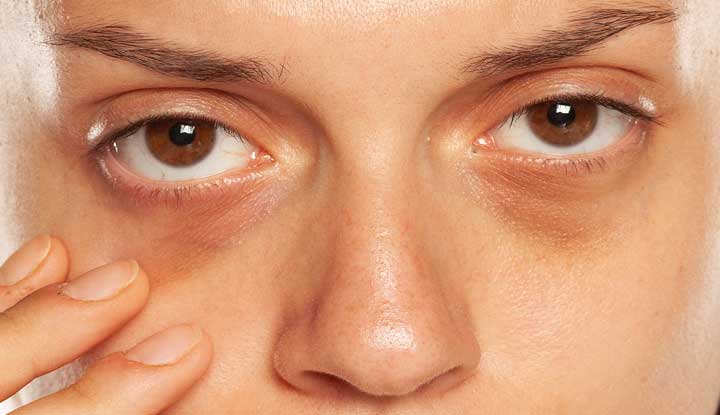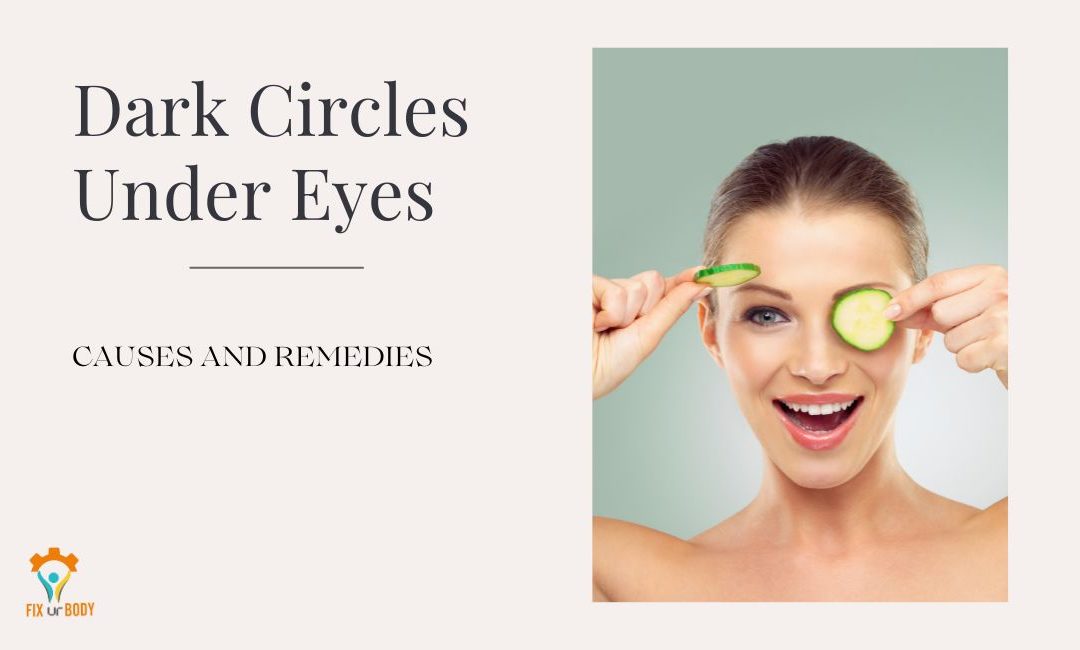Waking up to find shadowy circles under your eyes can be a disheartening start to the day. These unwelcome visitors do more than just mar your appearance; they can also chip away at your self-esteem. But what is the dark under eyes cause, and more importantly, what is the remedy? This article dives deep into the root dark under eyes causes, including dietary culprits, nutritional deficiencies, and when it might be time to consult a specialist.
Table of Contents
Understanding Dark Under Eyes Cause
Dark circles under the eyes are a common concern for many people, often leading to a tired and aged appearance. While they are typically harmless, understanding the underlying dark under eyes causes can help in finding effective solutions.
The skin beneath our eyes is the body’s most delicate area, making it particularly susceptible to darkening. While genetics play a significant role, factors like aging, sleep deprivation, and stress also contribute.

List of attributing factors – dark under eyes causes:
- Genetics: Some individuals are predisposed to having thinner skin around the eyes, making blood vessels more visible and leading to darker pigmentation.
- Age: As we age, the skin naturally loses collagen and becomes thinner, making dark circles more prominent.
- Fatigue and Lack of Sleep: Insufficient sleep or poor quality of sleep can cause blood vessels to dilate, resulting in dark circles.
- Dehydration: Not drinking enough water can cause the skin to appear dull and sunken, exacerbating the appearance of dark circles.
- Sun Exposure: UV rays can damage the delicate skin around the eyes, leading to pigmentation changes and the appearance of dark circles.
- Allergies: Histamines released during allergic reactions can cause blood vessels to dilate and lead to under-eye puffiness and dark circles.
- Smoking: Tobacco smoke contains chemicals that can accelerate aging and lead to skin discoloration, thus being an important dark under eyes cause.
- Poor Diet: Consuming foods high in salt, sugar, and processed ingredients can contribute to fluid retention and inflammation, worsening the appearance of dark circles.
Dark Under Eyes Cause Contributes By Food
Did you know that your diet and certain deficiencies can cast these shadows too? Certain foods can exacerbate or even cause dark circles. High-salt foods lead to fluid retention, causing the under-eye area to appear puffier and darker. Likewise, alcohol and caffeine can dehydrate your skin, making dark circles more pronounced. Moderation is key, as is staying hydrated with plenty of water.
While specific foods may not directly be a dark under eyes cause, certain dietary habits can exacerbate underlying factors such as inflammation and dehydration. Foods to moderate or in some severe cases avoid include:
- High-Sodium Foods: Excessive salt intake can lead to fluid retention, causing puffiness and exacerbating the appearance of dark circles.
- Processed Foods: Foods high in sugar and unhealthy fats can contribute to inflammation and skin aging, potentially worsening dark circles.
- Alcohol: Excessive alcohol consumption can dehydrate the body and dilate blood vessels, leading to dark circles and puffiness.
- Caffeine: While moderate caffeine consumption is generally safe, excessive intake can interfere with sleep quality, contributing to dark circles.
- Food Allergens: For individuals with food sensitivities or allergies, consuming trigger foods can lead to histamine release and exacerbate dark circles.
The Impact of Iron Deficiency and Anemia
Iron deficiency and anemia can rob your skin of its healthy glow, leading to a pale and drawn appearance that makes dark circles more noticeable. Iron is crucial for carrying oxygen in the blood, and without enough, your under-eye skin can appear darker.
- Low Iron: Iron deficiency can lead to pale skin and visible blood vessels, which may be a dark under eyes cause.
- Anemia: Anemia, a condition characterized by low red blood cell count or hemoglobin levels, can result in reduced oxygen delivery to tissues, including the delicate skin around the eyes, leading to a darkened appearance.
While dark under eyes causes are various, ensuring adequate iron intake through dietary sources such as lean meats, beans, fortified cereals, and leafy greens is essential for overall health and may help alleviate the appearance of dark circles caused by iron deficiency. If suspected, consulting a healthcare professional for proper diagnosis and treatment is recommended.
Vitamin Deficiencies and Dark Circles
Vitamins K, C, and E play pivotal roles in skin health. Ensuring your diet is rich in these vitamins can help keep dark circles at bay.
- Vitamin K: Some research suggests that vitamin K deficiency may contribute to dark circles by impairing blood clotting and circulation, and potentially reducing the visibility of blood vessels beneath the delicate eye area. Additionally, some research suggests that vitamin K may have anti-inflammatory properties, which can further aid in reducing puffiness and discoloration around the eyes. While more studies are needed to fully understand its effects on dark circles, incorporating vitamin K-rich foods like leafy greens, broccoli, and Brussels sprouts into your diet or using topical products containing vitamin K may help improve the appearance of dark circles over time.
- Vitamin C: Adequate intake of vitamin C is essential for collagen production and skin health, aiding in skin firmness and elasticity, which can reduce the prominence of dark circles. . Deficiency in vitamin C may contribute to skin discoloration and dark circles. Its potent antioxidant properties help shield the skin from free radical damage, preserving collagen and promoting a youthful appearance. Furthermore, its brightening effects can help diminish pigmentation irregularities, contributing to a more even skin tone. Incorporating vitamin C into skincare routines through topical serums or consuming vitamin C-rich foods like citrus fruits and bell peppers may help minimize the appearance of dark circles over time.
- Vitamin E: Vitamin E protects against sun damage and aging. Renowned for its antioxidant prowess, may indirectly aid in diminishing dark circles under the eyes. Its potent antioxidant properties combat free radicals, preserving skin elasticity and reducing premature aging signs. Moreover, vitamin E’s moisturizing capabilities help maintain skin hydration, potentially alleviating dryness that accentuates dark circles. Additionally, its anti-inflammatory properties may soothe skin irritation and reduce puffiness around the eyes. While evidence linking vitamin E directly to dark circle reduction is limited, incorporating it into skincare routines through topical products or dietary sources like nuts and avocados can contribute to overall skin health and potentially mitigate dark circle appearance.
Prevention and Remedies
Fighting dark circles begins with a balanced diet rich in iron and vitamins. Green leafy vegetables, citrus fruits, nuts, and whole grains are excellent sources. Adequate hydration and sleep are non-negotiables, alongside regular skincare routines that include moisturizing and sun protection.
Addressing dark circles under the eyes often involves a combination of lifestyle changes, skincare practices, and, in some cases, medical treatments. Here are some effective remedies to consider:

- Get Sufficient Sleep: Ensuring you get enough quality sleep is crucial for reducing the appearance of dark circles caused by fatigue. Aim for 7-9 hours of sleep per night and establish a consistent sleep schedule.
- Hydrate Well: Proper hydration is essential for maintaining skin elasticity and reducing puffiness. Drink plenty of water throughout the day to keep your skin hydrated.
- Use Cold Compresses: Applying a cold compress or chilled cucumber slices to the eyes can help constrict blood vessels, reduce puffiness, and temporarily lighten dark circles.
- Apply Eye Creams: Look for eye creams containing ingredients such as vitamin C, vitamin K, retinol, caffeine, or hyaluronic acid. These ingredients can help brighten the under-eye area, improve circulation, and reduce the appearance of dark circles over time.
- Protect Your Skin from Sun Damage: Wear sunscreen and sunglasses whenever you’re outdoors to protect the delicate skin around your eyes from harmful UV rays, which can contribute to dark circles and premature aging.
- Manage Allergies: If allergies are contributing to dark circles, work with a healthcare professional to identify and manage allergens. Antihistamines and allergy medications can help reduce inflammation and puffiness.
- Adjust Your Diet: Incorporate nutrient-rich foods into your diet, such as fruits, vegetables, lean proteins, and whole grains. Additionally, ensure adequate iron intake in your diet. Foods high in antioxidants, vitamins, and minerals can support skin health and reduce the appearance of dark circles.
- Reduce Salt Intake: High sodium intake can lead to fluid retention and exacerbate puffiness and dark circles. Limit your consumption of processed and salty foods.
- Practice Good Skincare: Use a gentle cleanser and moisturizer daily, and consider incorporating an eye cream into your skincare routine. Be gentle when applying skincare products to avoid causing further irritation to the delicate skin around the eyes.
- Consider Medical Treatments: In some cases, medical treatments such as chemical peels, laser therapy, dermal fillers, or prescription medications may be recommended to address stubborn dark circles. Consult a dermatologist or healthcare professional to discuss the best treatment options for your specific needs.

Remember, consistency is key when it comes to treating dark circles under the eyes. It may take time to see results, so be patient and stick to your chosen remedies and treatments.
When to See a Specialist
While dark circles are often harmless and more of a cosmetic concern, persistent and severe cases warrant medical attention. If you notice sudden worsening without any clear reason, such as dietary changes or sleep issues, it’s wise to consult a specialist. This could be a dermatologist or a healthcare provider who can assess for underlying health issues like allergies, eczema, or thyroid problems.
Conclusion
Dark circles under the eyes are a common concern that can usually be addressed with dietary changes, lifestyle adjustments, and proper skincare. However, understanding the root dark under eyes causes is crucial for effective treatment. If you’ve made all possible changes and dark circles persist, it may be time to seek advice from a specialist. Remember, the key to banishing those shadows lies not just in what you put on your skin, but also in the nutrients you feed your body.


